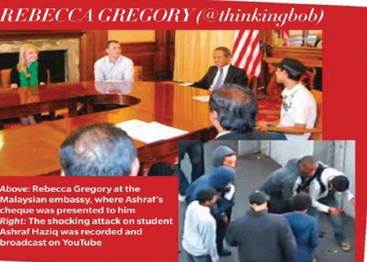Can a life-defining moment happen in
just 140 characters? These women think so…
AmiraHamed (@Amiralx)
“Twitter helped inspired me during the
Egyptian revolution”
AmiraHamed, 29, is a journalist and poet
based in Cairo. She took part in the protests in Tahrir Square that were the
focal point of 2011’s revolution against President Hosni Mubarak.
“The revolution changed the life of every
Egyptian and Twitter helped that happen. Some of the most powerful tweets I saw
were on January 25 2011, the day of the first big protest. I’m an editor on an
independent newspaper, and I’d been covering the news from the office, hearing
about people being arrested and beaten. I could see people tweeting from
marches and headed to Tahrir Square. Veteran activists who’d been involved in
protests for years were ecstatic and the sheer numbers of tweets they were
seeing. The more there were, the more people at home were inspired to be part
of it – even people who, until then, had been too afraid to participate in
protests against President Mobarak’s regime.
When I finished work, I went to Tahrir. I
felt compelled - through my job, I’ve been exposed to so many stories of human
rights violations and police torture because of Mubarak’s corrupt regime, and
it was becoming more blatant – sometimes we’d follow stories for years without
seeing justice being brought. Until that night, on some level, I was repressed
and afraid – you don’t know who’s going to be detained, beaten or shot. I left
the protests after midnight, and soon after that, the crackdown began. I saw
tweets from friends telling how they’d been teargassed. It was so emotional.
Twitter had become a way to communicate what was happening. You’d send
warnings: “Don’t come to this entrance, we’re being attacked.” Someone created
an account called @tahrirsupplies, to tweet what was needed by field hospitals.
It worked so well that after three or four days they were overstocked.
It was a huge boost to see what was
happening here on trending lists worldwide, and to know people around the world
supported us. On the day Mubarak fell, I tweeted, “THIS is the most important
moment we have ever experienced…we just ousted dictator!” I’ve never felt
powerful, and the country was bursting at the seams of hope. That’s why all
these regimes were in danger. Twitter may be a public network, but people
aren’t afraid to speak their minds anymore.”
Rebecca Gregory (@thinkingbob)
“I helped raise £23,000 for a victim of
the London riots on Twitter”
Rebecca Gregory, 26, runs Thinking Bob
Events (meetup.com/thinking-bob)

“It was the morning after the worst night
of rioting when I saw the #SomethingNiceForAshrafhashtag on Twitter. I was
living in Brixton, and all around me shops were burnt out, smashed in or closed
up. I was scared to even go out for a walk. I was glued to the TV and Twitter,
thinking, is this England? Then, when I saw the Youtube footage of Ashraf Haziq
being robbed, like everyone, I was disgusted. Initially, it looked as though
those men were going to help him, but then you realise they’re robbing him.
When I learned he was an exchange student from Malaysia who had only been
here for a month, I was so ashamed of our country. I really wanted to help.
The hashtag was created by a man named
Jamie Cowen, who wanted to raise money either to replace the things that were
stolen or to fly his parents over so they could visit him in hospital –
Ashraf’s jaw had been broken and some of his teeth were damaged. I volunteer
for a charity, so I tweeted him and offered to help. It was so exciting. We
were up all night setting up a JustGiving page and Tweeting about it, and after
Jamie went on the radio the next morning, it exploded. I couldn’t believe a
hashtag could do so much. By the next evening, we had £22,000.
It was exhilarating, but I also started to
panic, because the original reasons for raising the money were no longer
necessary. By then, Big Fish had replaced his bike, PlayStation had given him a
new console and numerous dentists were offering to do his dental work for free.
Jamies and I were invited to the Malaysian Embassy to hand over the cheque, and
the three of us met. Ashraf is sweet and shy, and he decided to give away some
of the money to rebuild a youth centre that had been damaged in this riots.
It showed me the power of Twitter and made
people realise our country does have a heart. I’ve had such positive
response – the investors in my business told me that what I did with Twitter
that day encouraged them to put their faith in me and my business. I acted on
impulse, and I’m so glad what I did.”